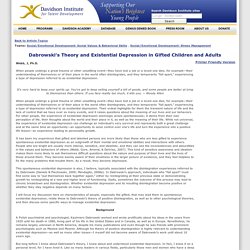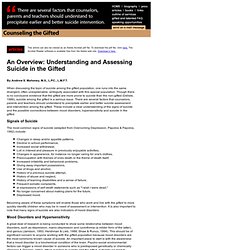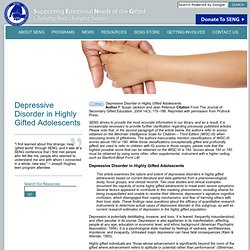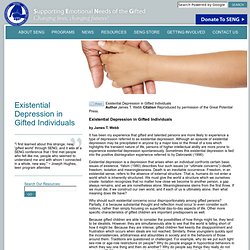

Dabrowski’s Theory and Existential Depression in Gifted Children and Adults. Webb, J, Ph.D.

When people undergo a great trauma or other unsettling event—they have lost a job or a loved one dies, for example—their understanding of themselves or of their place in the world often disintegrates, and they temporarily "fall apart," experiencing a type of depression referred to as existential depression. It's very hard to keep your spirits up. You've got to keep selling yourself a bill of goods, and some people are better at lying to themselves than others. If you face reality too much, it kills you. ~ Woody Allen When people undergo a great trauma or other unsettling event—they have lost a job or a loved one dies, for example—their understanding of themselves or of their place in the world often disintegrates, and they temporarily "fall apart," experiencing a type of depression referred to as existential depression.
Background But long before I knew about Dabrowski’s theory, I knew about and understood existential depression. Existential Issues and Giftedness Life Meaning. Counseling the Gifted: Suicide in the Gifted. This article can also be viewed as an Adobe Acrobat pdf file.

To download the pdf file, click here. The Acrobat Reader software is available free from the Adobe web site. Download it here. An Overview: Understanding and Assessing Suicide in the Gifted By Andrew S. When discussing the topic of suicide among the gifted population, one runs into the same divergent, often unexplainable, ambiguity associated with this special population. Signals of Suicide The most common signs of suicide (adapted from Overcoming Depression, Papolos & Papolos, 1992) include: Becoming aware of these symptoms will enable those who work and live with the gifted to more quickly identify children who may be in need of assessment or intervention. Mood Disorders and Hypersensitivity Jamison is also able to demystify the hypersensitivity of gifted persons.
References Delisle, J.R. (1986). ³Death with honors: Suicide among gifted adolescents.² Journal of Counseling and Development, 64. Amazon. Sylvia Plath, Giftedness and Existential Depression. [N.B.

Please note that this is a re-write of an article I first wrote in November 2012, that was partially lost when this site was hacked.] It’s very hard to keep your spirits up. You’ve got to keep selling yourself a bill of goods, and some people are better at lying to themselves than others. If you face reality too much, it kills you. [Woody Allen] Today is the 50th anniversary of the death of Sylvia Plath by suicide, and everyone is talking about her prodigious talent, her mental health, her two young children and her absent husband. It is possible that Plath experienced joy as a direct result of her intellectual abilities, but perhaps it was that very genius itself – not the snow or the loneliness or motherhood or marriage; not even the rejection – that was the reason for her suicide. We have a tendency to romanticise genius, and to set those touched by it apart from ourselves. The reality of motherhood however, is that looking after children is a full-time job with little respite.
SENG The Gifted At Risk for Depression - Dr. James T. Webb. J_E_G_Publication.pdf. Dabrowski’s Theory and Existential Depression in Gifted Children and Adults. Depressive Disorder in Highly Gifted Adolescents. SENG strives to provide the most accurate information in our library, and as a result, it is occasionally necessary to provide further clarification regarding previously published articles.

Please note that, in the second paragraph of the article below, the authors refer to scores obtained on the Wechsler Intelligence Scale for Children – Third Edition (WISC-III) when discussing levels of giftedness. The authors inaccurately mention classifications of WISC-III scores above 160 or 180. While those classifications (exceptionally gifted and profoundly gifted) are used to refer to children with IQ scores in those ranges, please note that the highest possible score that can be obtained on the WISC-III is 160. Scores above 160 or 180 must be obtained by using some other, often supplemental, instrument with a higher ceiling, such as Stanford-Binet Form LM.
Depressive Disorder in Highly Gifted Adolescents Depression is potentially debilitating, invasive, and toxic. Existential Depression in Gifted Individuals « SENG. Existential Depression in Gifted Individuals by James T.

Webb It has been my experience that gifted and talented persons are more likely to experience a type of depression referred to as existential depression. Although an episode of existential depression may be precipitated in anyone by a major loss or the threat of a loss which highlights the transient nature of life, persons of higher intellectual ability are more prone to experience existential depression spontaneously. Sometimes this existential depression is tied into the positive disintegration experience referred to by Dabrowski (1996). Existential depression is a depression that arises when an individual confronts certain basic issues of existence. Why should such existential concerns occur disproportionately among gifted persons? Because gifted children are able to consider the possibilities of how things might be, they tend to be idealists. How can we help our bright youngsters cope with these questions?